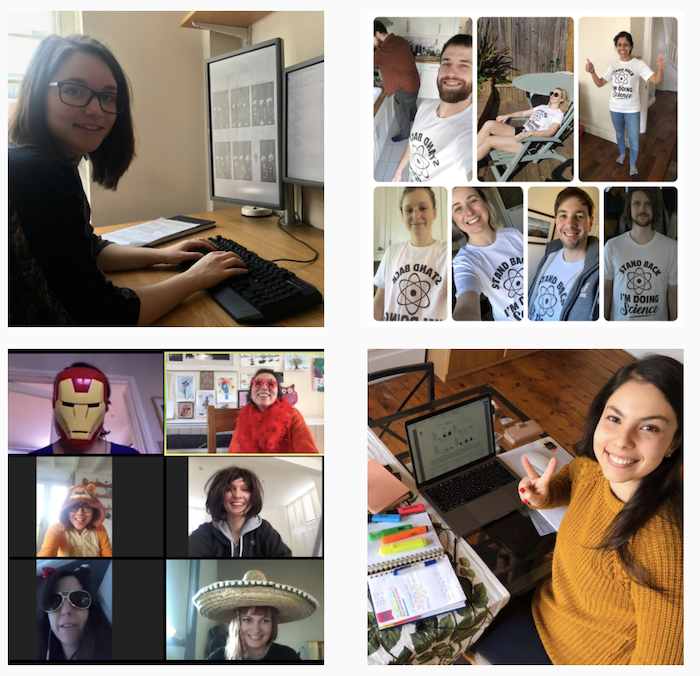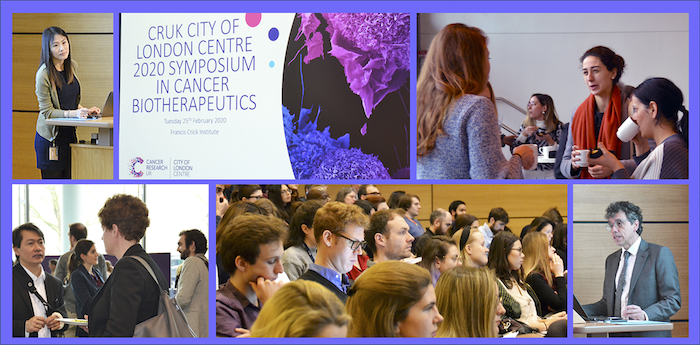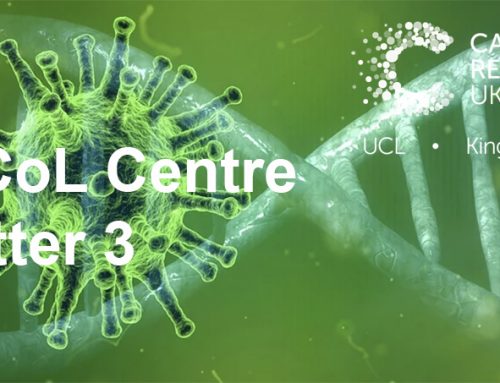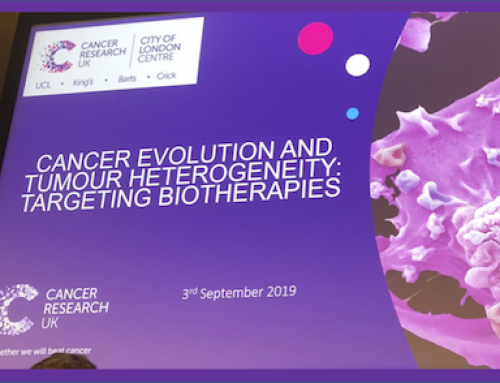Find out about the latest CoL Centre news plus upcoming events, seminars, courses, networking and project calls.
In this unprecedented time we hope that you are all safe and well. We would like to express our thanks to everyone for finding innovative ways to continue generating great research, and to those of you that are directly involved in the Covid-19 response.
News
CoL Centre Symposium – 25 February 2020
The CoL Centre annual symposium, held at the Crick, was a great success and really showcased the outstanding research and collaborations that have developed within the Centre. Talks were given by researchers working in all four research programme areas. Some highlights included a fascinating talk on targeting Wnt signalling in colorectal cancer by Dr Vivian Li (Crick). In the cross-disciplinary approaches enhancing biotherapeutics session Prof Phil Blower (King’s) discussed molecular imaging techniques in cancer using novel radiotracers while Prof Axel Behrens (Crick) gave a very entertaining lecture on the mechanisms of tumour heterogeneity. In session 3, Prof Sergio Quezada (UCL) presented the mechanisms to inform development of novel therapeutics and in the final paediatric cancer session Prof Silvia Marino (QMUL) spoke about her research on the epigenetic deregulation in malignant brain tumours. Last year’s Development Fund winners, Prof Francesca Ciccarelli (King’s / Crick) and Dr Chris Tape (UCL), also gave short talks on how this funding has impacted their research. Finally, our first year PhD students and clinical fellows introduced their projects to the CoLCentre via the form of short presentations.

In November 2019 CRUK awarded funding to the CoL Centre as part of its radiation network (RadNet) initiative. This UK wide network (which includes 7 CRUK centres of excellence) will bring together researchers across discovery, translational and clinical research that will ultimately improve patient outcomes.
The CRUK City of London Radiation Research Unit will feature an ambitious research programme for radiation oncology and radiation biology and will accelerate the development of advanced radiotherapy techniques, challenging the boundaries of this mainstay treatment through world-first exploratory projects.
If you would like more information on RadNet please visit the website or contact: cruk-radnet-cityoflondon@ucl.ac.uk
CoL Centre Student Recruitment
The 2020 intake of CoL Centre trainees is well underway and we have recruited 3 clinical fellows, 3 PhD students and 1 MBPhD student to our programme so far. We hope to continue expanding our student cohort with the addition of more MBPhD and RadNet students and look forward to welcoming all to the programme later this year.
Currently we have a call open for RadNet PhD studentships; applications close on the 14th of April 2020. Please click here for more details.
Calls and Awards
Funding Calls
RadNet Spring 2020 seed funding:
5 awards of up to £25,000 are available to pump-prime and support collaborative groups who are tackling the major challenges in radiobiology and radio-oncology. Projects are expected to commence in May 2020. For more information please visit the website
Application Deadline: midnight on Wednesday, 15th April 2020
Development Fund Awardees
The CoL Centre Development Fund provides short-term pump-priming funds (up to £25 000 over a year) to support innovative research projects and support inspirational, proof-of-concept cancer research throughout the Centre and generate preliminary data to leverage further funding.
Congratulations to the following CoL Centre faculty that have received funding for this year:
- Understanding the impact of systemic immune tolerance caused by melanoma interacting with the liver microenvironment. Erik Sahai (Crick), Mala Maini (UCL) Co-applicants: Rebecca Lee (Crick), Laura Pallett (UCL), Mariana Diniz (UCL).
- Tracing and timing pre-cancerous clonal dynamics in normal tissues. Marnix Jansen (UCL) Co-applicants: Kit Curtius (Barts), David Graham (UCL), Matthew Banks (UCL).
- The differential contribution of tumour infiltrating and circulating neutrophils to chemotherapy resistance in early breast cancers. Sheeba Irshad (KCL) Co-applicants: Ilaria Malanchi (Crick), Shahram Kordasti (KCL).
- Evolution and ecology of oesophageal adenocarcinoma under neoadjuvant treatment. Trevor Graham (Barts). Co-applicants: Melissa Schmidt (Barts), Marnix Jansen (UCL), Benny Chain (UCL).
- Targeted reversal of epigenetic silencing at specific tumour suppressor genes in lymphoma. Richard Jenner (UCL) Co-applicants: Jude Fitzgibbon (Barts)
- Developing organotypic models of human osteosarcoma. Sibylle Mittnacht (UCL) Co-applicants: Wenhui Song (UCL), Ilaria Malanchi (Crick).
Events
We are working on how to transfer upcoming events and seminars to online platforms. As soon as we have these up and running we will post the details on the events webpage.

What is your role and what does it involve?
I am the CoL Centre Project Manager, which means I am the person responsible for implementing and coordinating all Centre activity. That includes a huge range of tasks – some examples are: liaising with lawyers to set up a partnership agreement, liaising with HR and PIs to hire all the Centre staff; supporting the themes to develop their scientific programs; managing networking activities like seminars, the symposium; and many more including managing the budget and agreeing the strategic direction with the Executive Board. This Centre is a partnership of four major institutions: UCL, Barts, King’s and the Crick, and it is important that there is coordination across them. I make sure that this is the case.
What achievement are you most proud of?
The Centre has now been operating full steam for a year. When I started, the Centre was not operational. Now we have 22 members of staff and 10 students who are all working to help deliver the mission of the Centre; to develop new biotherapies for cancer. In just one year we are starting to see new discoveries that will shape how cancer patients are treated in the future. I am proud of having set the operational grounds that enable scientists to make this happen.
What would it surprise people to know about you?
That I am not a singer in my spare time……but my sister is. Luckily she did not get my name as it would be rather bizarre to have two singers with the same name Christina Aguilera. She is Marta Aguilera, check her out on Spotify.
What is your favourite movie / music album?
I love British films like Four weddings and a Funeral and Love Actually, maybe that is what really inspired me to move to London actually, not science.
What do you like to do when you are not working for the CoL Centre?
I like playing tennis, I love going out for dinner or just to the pub with friends and I like travelling a lot. Since I had kids, I do a lot less of those, so when I am not working, I would like to do all those things, instead I am usually playing snakes and ladders or watching Peppa Pig.
Do you have favourite joke?
I love jokes, another of my favourite things is to watch comedy.
Here is one from Spain to the UK (with love): we see the British as the ones that invented football and then forgot how to play it …
and finally…..
Some of the new ways that we are all working 🙂
 Clockwise from top left
Clockwise from top left
Eva Bugallo Blanco (CoL Centre PhD student) “Now it’s the time to focus on many other tasks essential for our research but usually neglected due to the busy and long days spent running experiments in the lab. While working from home I have dedicated some days to data analysis to draw conclusions from finished experiments and flag points that need to be addressed but most of my time goes into reading the latest literature in the field and giving myself the time to think about other areas I would like to explore and how I could do that during my PhD.”
Tim Witney’s lab banding together with specially designed “scientist working from home” t-shirts!
A CoL Centre management team zoom meeting with props!
Alessandra Ferrelli (CoL Centre PhD student) is “reading papers, will start writing a review article in my field and am also following different webinars and having virtual meetings with my supervisors and my team members. I try to set deadlines in order to remain concentrated at home, and I think it is working well. Although I cannot perform any experiments, there are loads of things that I can do to make this time as productive as possible!”




Leave A Comment
You must be logged in to post a comment.